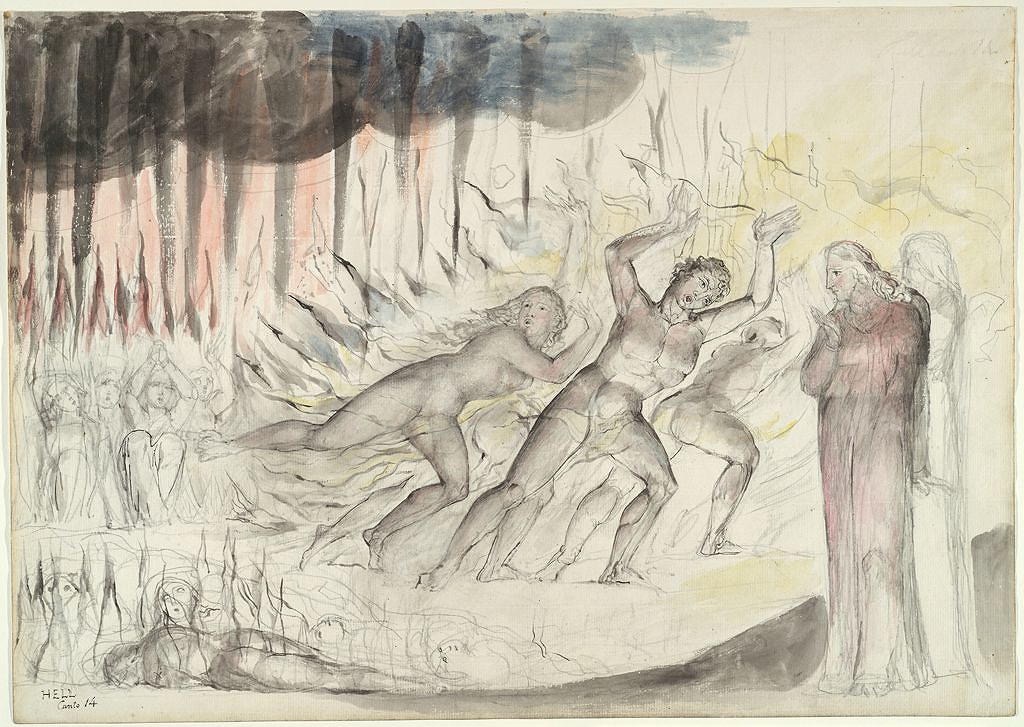Phobe

William Blake: Dante and Virgil Among the Blasphemers (1824-27)
"We swallow hard and continue humiliating ourselves …"
©2023 by David A. Schmaltz - all rights reserved
I firmly believe that we remain in the first technology era, the same one that featured both steam power and plug-board computing. Our more modern user interfaces only appear more advanced, for they remain enmired within the most primitive possible mindset. We have not yet stumbled into more sophisticated orientations, even though we suffer daily under the yoke of our backward understanding. No better example exists than what I might call The State Of The App. My iPhone and my laptop run many different apps. However, they each feature the same shortcoming, that being that I, their primary user, do not in any way understand how to properly use them. That's okay, the apologists explain, because nobody understands the first thing about the least them, not even their designers.
I rest my case there. In a less primitive future world, the typical user of an application would quite naturally understand how to use the damned thing. But, then, I suspect, an app will not be referred to as an app unless it exhibits this most simple of attributes, merely that the least of its users experience no difficulty understanding what it's for and how to make it dance. Sadly, we're today far, far, far away from that state. Today, even the most canny "technologists" wisely consider themselves Phobes. Like the rest of us, they live in abject fear of the so-called apps we employ. We live as virtual slaves to them. We understand that we hold no natural right to believe that we'll ever come to better understand them. We use them like our forebears employed witchcraft, hesitantly accepting that if anything were promising even a little more promise, we'd switch to that in a minute. We employ technology now, in this first era of technology, more as a declaration of our abiding ignorance than to demonstrate that we know or understand anything. Not a single user of FaceBook understands how to properly use it, including its designers.
Most of us cannot even successfully log into a typical application without the assistance of a higher-order application, of which we also possess no actual knowledge. We hunt and peck and sometimes feel rewarded, the beneficiary of essential randomness masquerading in our minds as thoughtful design. We're even grateful sometimes, our memories increasingly foreshortened by experience, lest we remember just how impossible even the least of our transactions one day seemed, and some days remain. I mention this state of affairs because I'm facing a choice, one for our age. I'm facing the option of picking up a new app, which might be a supplement and could potentially be a replacement. It promises, of course, to be no better than whatever it might replace. I'm confident, for instance, to never fully adapt to or even understand what the app actually does. It's destined to become yet another abiding mystery.
I insist that I'm now performing my due diligence, a laughable proposition with which I surprise myself by merely listening to my sorry explanation. I will find a raft of purported explanations, none of which will successfully explain anything. They will have been produced by those who've deluded themselves into believing that they understand something about the application. Heaven forbid that the actual purported designers of the damned thing make those explanations, because those folks long ago lost both the language and perspective of someone who's not yet immersed in the app's essential trance. They can only explain to their own satisfaction. Their descriptions might just as well be recorded in Pig Latin. They employ terms that have special meanings within the application, meanings for which no naive user could ever even imagine the underlying intention. The harder they try to explain, the more opaque their explanation.
I have never once adopted an app that worked or one I felt I’d figured out. I've used email for decades and still cannot manage to manage that queue. I long ago concluded that it was impossible and that the original designers insisted upon a finished product that accumulates incoming at rates exceeding any feasible possibility of deleting. One uses apps blindly or not at all. One comes to increase their tolerance of potentially catastrophic shortcomings or could not use any app. After fifteen years of FaceBook use, I continue to post blindly. I could not find how to bring up a list of past postings for the life of me. Unsurprisingly, the help menus rarely feature links to anything that helps resolve even the most straightforward query, yet I continue subjecting myself to the app's abuse.
Success primarily involves simply engaging in things that one naturally does well. In a better world, this would probably include nobody ever employing anything remotely as primitive as apps to accomplish anything. I tell myself that even Shakespeare probably had to at least somewhat master shaving goose feathers, a technology at least as primitive as our modern-day apps. He wrote no plays extolling his feather-shaving skills or anyone else's, though I suspect he complained plenty offline. We all have our annoyances, and not one of us ever manages to rise very much above our era's technological advances and their deeply embedded setbacks. We swallow hard and continue humiliating ourselves in passionate, thoughtless pursuit of our Success.


